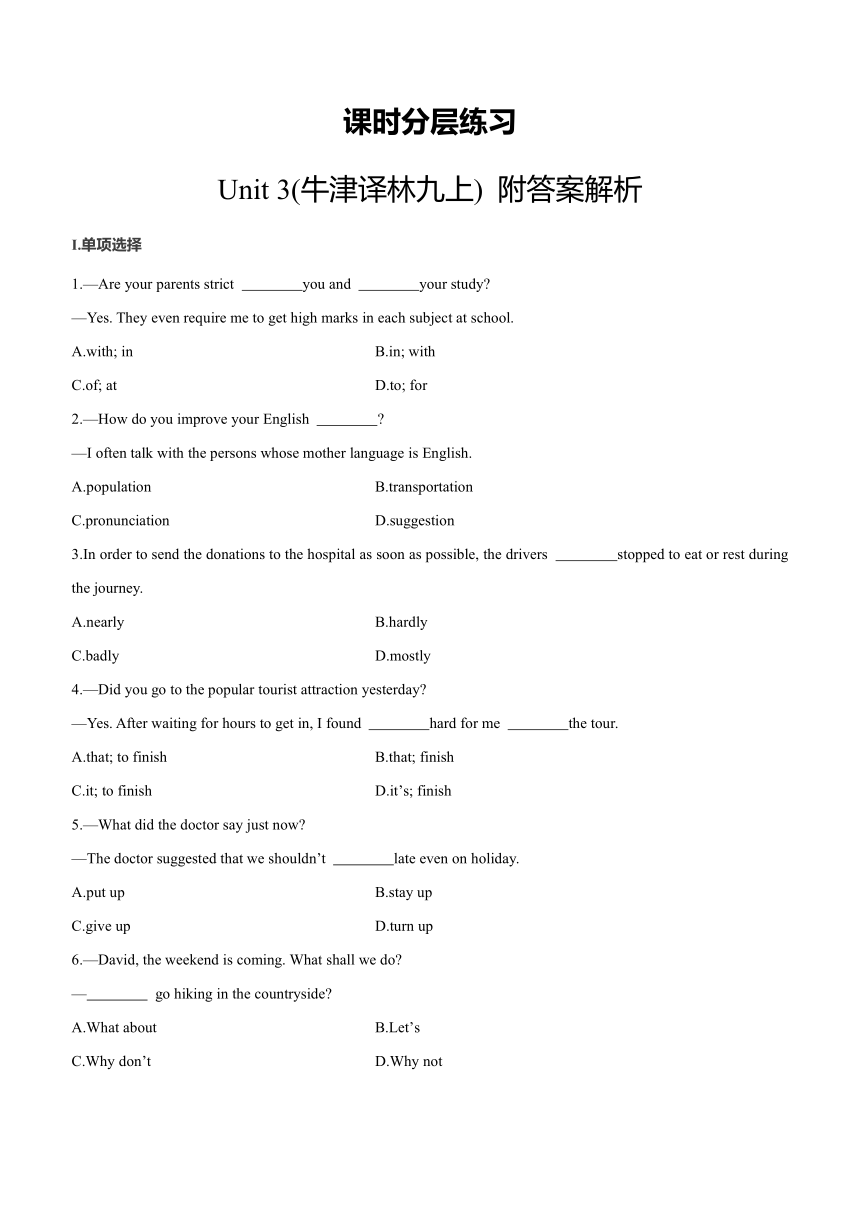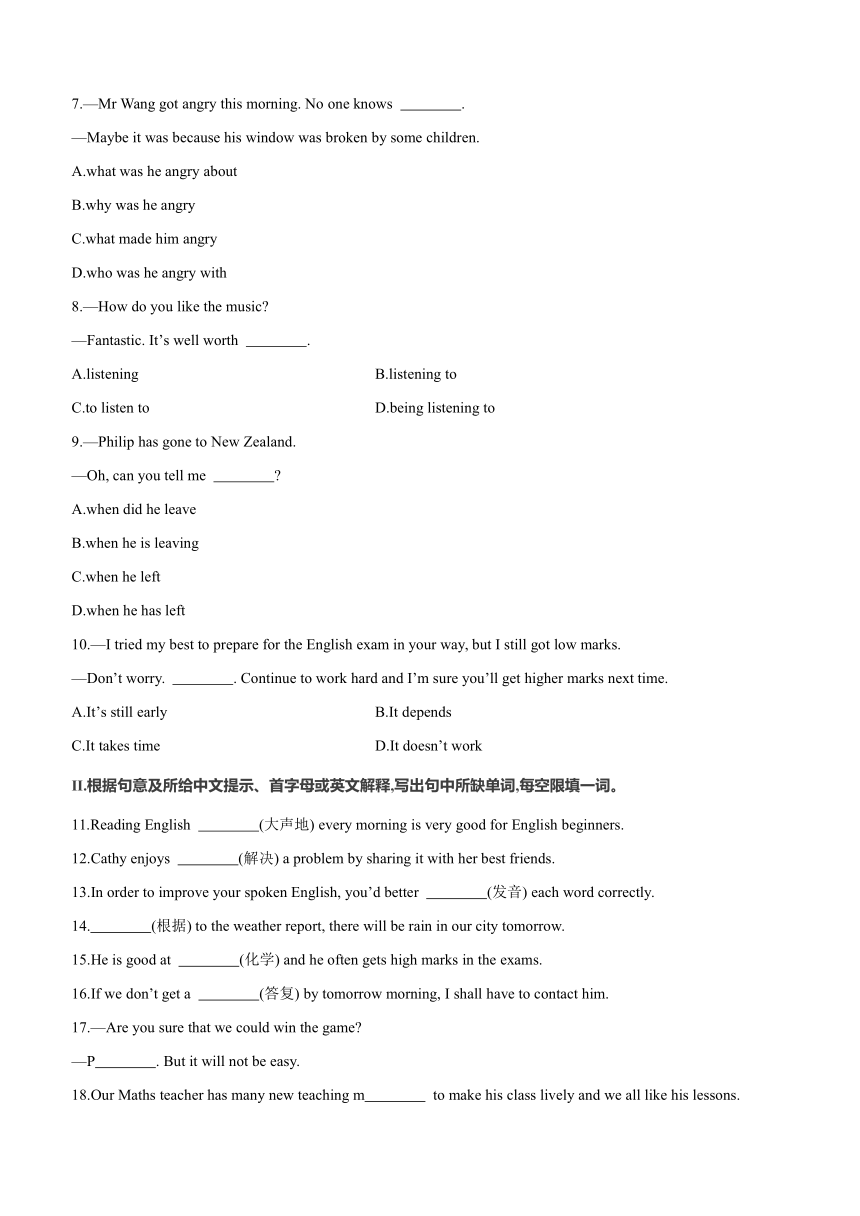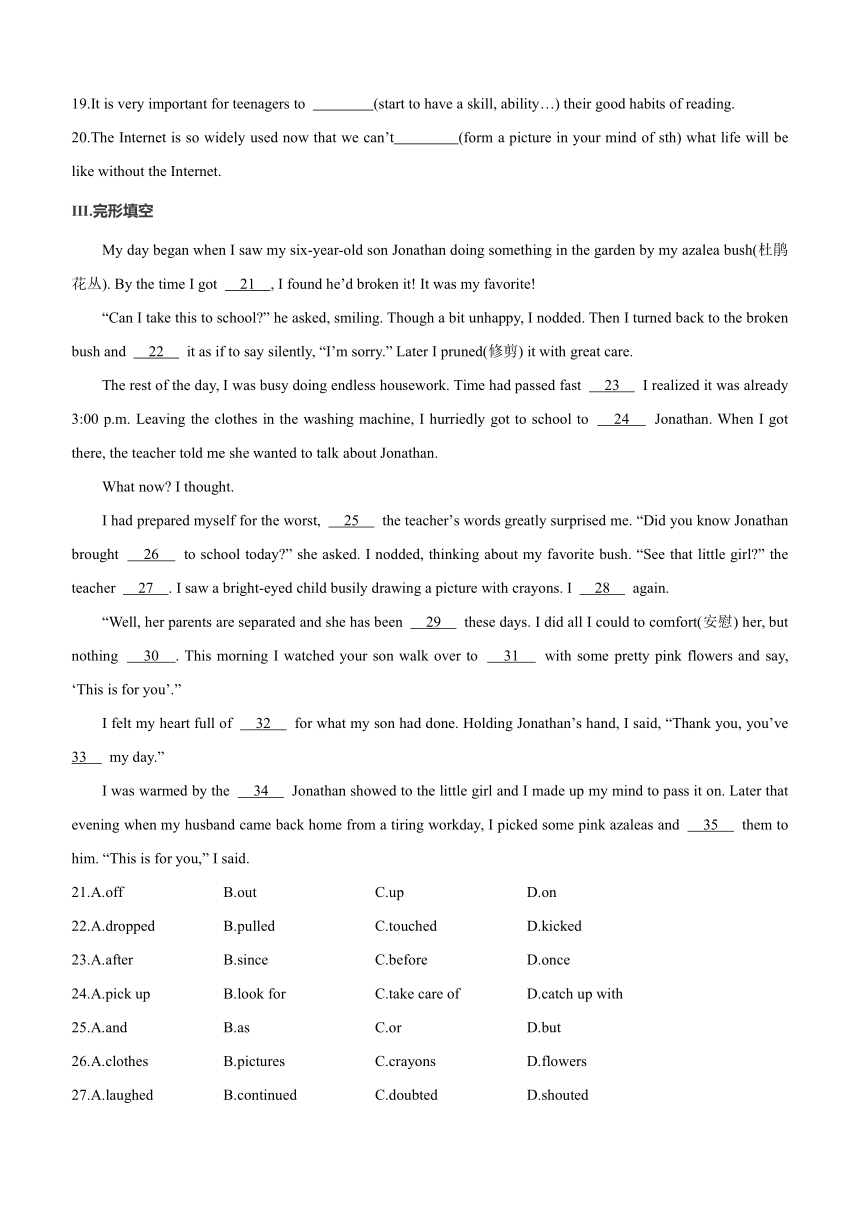Unit 3 Teenage problems同步练 (含解析)牛津译林版英语九年级上册
文档属性
| 名称 | Unit 3 Teenage problems同步练 (含解析)牛津译林版英语九年级上册 |  | |
| 格式 | docx | ||
| 文件大小 | 28.5KB | ||
| 资源类型 | 教案 | ||
| 版本资源 | 牛津译林版 | ||
| 科目 | 英语 | ||
| 更新时间 | 2024-05-30 17:38:00 | ||
图片预览



文档简介
课时分层练习
Unit 3(牛津译林九上) 附答案解析
Ⅰ.单项选择
1.—Are your parents strict you and your study
—Yes. They even require me to get high marks in each subject at school.
A.with; in B.in; with
C.of; at D.to; for
2.—How do you improve your English
—I often talk with the persons whose mother language is English.
A.population B.transportation
C.pronunciation D.suggestion
3.In order to send the donations to the hospital as soon as possible, the drivers stopped to eat or rest during the journey.
A.nearly B.hardly
C.badly D.mostly
4.—Did you go to the popular tourist attraction yesterday
—Yes. After waiting for hours to get in, I found hard for me the tour.
A.that; to finish B.that; finish
C.it; to finish D.it’s; finish
5.—What did the doctor say just now
—The doctor suggested that we shouldn’t late even on holiday.
A.put up B.stay up
C.give up D.turn up
6.—David, the weekend is coming. What shall we do
— go hiking in the countryside
A.What about B.Let’s
C.Why don’t D.Why not
7.—Mr Wang got angry this morning. No one knows .
—Maybe it was because his window was broken by some children.
A.what was he angry about
B.why was he angry
C.what made him angry
D.who was he angry with
8.—How do you like the music
—Fantastic. It’s well worth .
A.listening B.listening to
C.to listen to D.being listening to
9.—Philip has gone to New Zealand.
—Oh, can you tell me
A.when did he leave
B.when he is leaving
C.when he left
D.when he has left
10.—I tried my best to prepare for the English exam in your way, but I still got low marks.
—Don’t worry. . Continue to work hard and I’m sure you’ll get higher marks next time.
A.It’s still early B.It depends
C.It takes time D.It doesn’t work
Ⅱ.根据句意及所给中文提示、首字母或英文解释,写出句中所缺单词,每空限填一词。
11.Reading English (大声地) every morning is very good for English beginners.
12.Cathy enjoys (解决) a problem by sharing it with her best friends.
13.In order to improve your spoken English, you’d better (发音) each word correctly.
14. (根据) to the weather report, there will be rain in our city tomorrow.
15.He is good at (化学) and he often gets high marks in the exams.
16.If we don’t get a (答复) by tomorrow morning, I shall have to contact him.
17.—Are you sure that we could win the game
—P . But it will not be easy.
18.Our Maths teacher has many new teaching m to make his class lively and we all like his lessons.
19.It is very important for teenagers to (start to have a skill, ability…) their good habits of reading.
20.The Internet is so widely used now that we can’t (form a picture in your mind of sth) what life will be like without the Internet.
Ⅲ.完形填空
My day began when I saw my six-year-old son Jonathan doing something in the garden by my azalea bush(杜鹃花丛). By the time I got 21 , I found he’d broken it! It was my favorite!
“Can I take this to school ” he asked, smiling. Though a bit unhappy, I nodded. Then I turned back to the broken bush and 22 it as if to say silently, “I’m sorry.” Later I pruned(修剪) it with great care.
The rest of the day, I was busy doing endless housework. Time had passed fast 23 I realized it was already 3:00 p.m. Leaving the clothes in the washing machine, I hurriedly got to school to 24 Jonathan. When I got there, the teacher told me she wanted to talk about Jonathan.
What now I thought.
I had prepared myself for the worst, 25 the teacher’s words greatly surprised me. “Did you know Jonathan brought 26 to school today ” she asked. I nodded, thinking about my favorite bush. “See that little girl ” the teacher 27 . I saw a bright-eyed child busily drawing a picture with crayons. I 28 again.
“Well, her parents are separated and she has been 29 these days. I did all I could to comfort(安慰) her, but nothing 30 . This morning I watched your son walk over to 31 with some pretty pink flowers and say, ‘This is for you’.”
I felt my heart full of 32 for what my son had done. Holding Jonathan’s hand, I said, “Thank you, you’ve 33 my day.”
I was warmed by the 34 Jonathan showed to the little girl and I made up my mind to pass it on. Later that evening when my husband came back home from a tiring workday, I picked some pink azaleas and 35 them to him. “This is for you,” I said.
21.A.off B.out C.up D.on
22.A.dropped B.pulled C.touched D.kicked
23.A.after B.since C.before D.once
24.A.pick up B.look for C.take care of D.catch up with
25.A.and B.as C.or D.but
26.A.clothes B.pictures C.crayons D.flowers
27.A.laughed B.continued C.doubted D.shouted
28.A.nodded B.turned C.smiled D.thought
29.A.sad B.tired C.bored D.angry
30.A.lasted B.appeared C.worked D.remained
31.A.him B.her C.them D.you
32.A.trust B.courage C.interest D.pride
33.A.recorded B.made C.missed D.stolen
34.A.kindness B.magic C.value D.humor
35.A.threw B.lent C.handed D.sent
Ⅳ.阅读理解
Are you shy If you are, you are not alone. In fact, close to 50 percent of people are shy. Almost 80 percent of people feel shy at some point in their lives. These days, shyness is becoming more and more common. Now, scientists are trying to understand shyness. They have some interesting ideas about why people are shy.
Is it possible to be born shy Many scientists say yes. They say 15 to 20 percent of babies behave shyly. These babies are a little quieter and more watchful than other babies. Interestingly, these shy babies usually have shy parents. As a result, scientists think that some shyness is genetic.
Family size might cause people to be shy as well. Scientists at Harvard University studied shy children. They found that 66 percent of them had elder brothers and sisters. As a result, they became shy. At the same time, children with no brothers or sisters may be shy as well. Growing up alone, they often play by themselves. They are not able to learn the same social skills as children from big families.
You may also be shy because of where you were born. When scientists studied shyness in different countries, they found surprising differences. In Japan, most people said they were shy. But in Israel, only one of three people said so. What explains the difference One scientist says the Japanese and Israelis have different opinions of failure. In Japan, when people do not succeed, they feel bad about themselves. They blame(责备) themselves for their failure. In Israel, the opposite is true. Israelis often blame failure on outside reasons, such as family, teachers, friends, or bad luck. In Israel, freedom of opinion and risk-taking are strongly supported. This may be why Israelis worry less about failure and are less shy.
For shy people, it can be difficult to make friends, speak in class, and even get a good job. But scientists say you can get over your shyness. They suggest trying new things and practicing conversations. And don’t forget—if you are shy, you are not the only one.
36.What does the underlined word “genetic” in Paragraph 2 probably mean
A.Passed down from parents.
B.Learned from friends.
C.Taught by teachers.
D.Made up by brothers.
37.What can be learned from the passage
A.Most little babies are born shy and quiet.
B.If you are shy now, you will be shy forever.
C.Many shy children have elder brothers and sisters.
D.Most Israeli people are shy of expressing opinions.
38.We can learn from the passage that may cause shyness.
A.genetics, grown-ups and birthplace
B.genetics, family size and birthplace
C.family size, grown-ups and failure
D.genetics, family size and freedom
39.Scientists suggest that shy people can get over their shyness by .
A.blaming their failure on outside reasons
B.trying new things and practicing conversations
C.getting themselves away from their shy parents
D.trying to understand reasons for their shyness
【参考答案】
Ⅰ.1.A
2.C 考查名词辨析。根据语境提示“talk with…”可知,此处指关于如何提高英语发音的问题。故选C。
3.B 考查副词辨析。根据前半句“In order to send the donations to the hospital as soon as possible”可知,后半句表示“在旅途中, 司机几乎没有停下来吃饭或休息”。表示“几乎不”, 应用hardly。故选B。
4.C 5.B 6.D 7.C 8.B 9. C 10. C
Ⅱ.11.aloud 12.solving 13.pronounce
14.According 15.Chemistry 16.reply
17.Perhaps 18.methods 19.develop
20.imagine
Ⅲ.21.B 考查副词辨析。根据空前的“I saw my six-year-old son Jonathan doing something in the garden by my azalea bush”可知,儿子在花园里,在屋外,所以当作者从屋里出来的时候,发现儿子破坏了杜鹃花丛。故选B。
22.C 考查动词辨析。根据上文中的“It was my favorite!”和空后的“I’m sorry.”可知,作者最喜欢杜鹃花了,看着被破坏的杜鹃花丛,作者很伤心,于是抚摸杜鹃花丛。故选C。
23.C 考查连词辨析。根据“Time had passed fast”和“I realized it was already 3:00 p.m.”可知,主句是过去完成时,从句是一般过去时,此处应用before引导时间状语从句,强调主从句动作发生的先后顺序。故选C。
24.A 考查动词短语辨析。根据空前的“I hurriedly got to school”可知,是去学校接儿子。故选A。
25.D 考查连词辨析。根据下文可知,空格前后两句之间存在转折关系,应用but连接。故选D。
26.D 考查名词辨析。根据第二段第一句“Can I take this to school ”可知,儿子把花带到了学校。故选D。
27.B 考查动词辨析。根据空前的“Did you know Jonathan brought…to school today ”以及“See that little girl ”可知,老师继续说。故选B。
28.A 考查动词辨析。根据第五段第三句中的“I nodded”及空后的again可知,此处指的是“再次点头”。故选A。
29.A 考查形容词辨析。根据空前的“her parents are separated”可知,她的父母分开了,女孩很伤心。故选A。
30.C 考查动词辨析。根据“I did all I could to comfort her, but nothing…”可知,老师做了她所有能做的去安慰女孩但都没有效果。故选C。
31.B 考查代词辨析。此处指代的是前面提到的小女孩,应用her代替。故选B。
32.D 考查名词辨析。根据上文老师的话可知,儿子做了一件好事,作者为儿子感到骄傲。故选D。
33.B 考查动词辨析。儿子的表现让作者很开心。make one’s day 意为“让某人很开心”。故选B。
34.A 考查名词辨析。儿子送给伤心女孩花是为了让女孩开心,这是一种善举。故选A。
35.C 考查动词辨析。根据空前的“when my husband came back home from a tiring workday, I picked some pink azaleas”和空后的“This is for you”可知,作者把花递给了丈夫。故选C。
Ⅳ.36—39 ACBB
Unit 3(牛津译林九上) 附答案解析
Ⅰ.单项选择
1.—Are your parents strict you and your study
—Yes. They even require me to get high marks in each subject at school.
A.with; in B.in; with
C.of; at D.to; for
2.—How do you improve your English
—I often talk with the persons whose mother language is English.
A.population B.transportation
C.pronunciation D.suggestion
3.In order to send the donations to the hospital as soon as possible, the drivers stopped to eat or rest during the journey.
A.nearly B.hardly
C.badly D.mostly
4.—Did you go to the popular tourist attraction yesterday
—Yes. After waiting for hours to get in, I found hard for me the tour.
A.that; to finish B.that; finish
C.it; to finish D.it’s; finish
5.—What did the doctor say just now
—The doctor suggested that we shouldn’t late even on holiday.
A.put up B.stay up
C.give up D.turn up
6.—David, the weekend is coming. What shall we do
— go hiking in the countryside
A.What about B.Let’s
C.Why don’t D.Why not
7.—Mr Wang got angry this morning. No one knows .
—Maybe it was because his window was broken by some children.
A.what was he angry about
B.why was he angry
C.what made him angry
D.who was he angry with
8.—How do you like the music
—Fantastic. It’s well worth .
A.listening B.listening to
C.to listen to D.being listening to
9.—Philip has gone to New Zealand.
—Oh, can you tell me
A.when did he leave
B.when he is leaving
C.when he left
D.when he has left
10.—I tried my best to prepare for the English exam in your way, but I still got low marks.
—Don’t worry. . Continue to work hard and I’m sure you’ll get higher marks next time.
A.It’s still early B.It depends
C.It takes time D.It doesn’t work
Ⅱ.根据句意及所给中文提示、首字母或英文解释,写出句中所缺单词,每空限填一词。
11.Reading English (大声地) every morning is very good for English beginners.
12.Cathy enjoys (解决) a problem by sharing it with her best friends.
13.In order to improve your spoken English, you’d better (发音) each word correctly.
14. (根据) to the weather report, there will be rain in our city tomorrow.
15.He is good at (化学) and he often gets high marks in the exams.
16.If we don’t get a (答复) by tomorrow morning, I shall have to contact him.
17.—Are you sure that we could win the game
—P . But it will not be easy.
18.Our Maths teacher has many new teaching m to make his class lively and we all like his lessons.
19.It is very important for teenagers to (start to have a skill, ability…) their good habits of reading.
20.The Internet is so widely used now that we can’t (form a picture in your mind of sth) what life will be like without the Internet.
Ⅲ.完形填空
My day began when I saw my six-year-old son Jonathan doing something in the garden by my azalea bush(杜鹃花丛). By the time I got 21 , I found he’d broken it! It was my favorite!
“Can I take this to school ” he asked, smiling. Though a bit unhappy, I nodded. Then I turned back to the broken bush and 22 it as if to say silently, “I’m sorry.” Later I pruned(修剪) it with great care.
The rest of the day, I was busy doing endless housework. Time had passed fast 23 I realized it was already 3:00 p.m. Leaving the clothes in the washing machine, I hurriedly got to school to 24 Jonathan. When I got there, the teacher told me she wanted to talk about Jonathan.
What now I thought.
I had prepared myself for the worst, 25 the teacher’s words greatly surprised me. “Did you know Jonathan brought 26 to school today ” she asked. I nodded, thinking about my favorite bush. “See that little girl ” the teacher 27 . I saw a bright-eyed child busily drawing a picture with crayons. I 28 again.
“Well, her parents are separated and she has been 29 these days. I did all I could to comfort(安慰) her, but nothing 30 . This morning I watched your son walk over to 31 with some pretty pink flowers and say, ‘This is for you’.”
I felt my heart full of 32 for what my son had done. Holding Jonathan’s hand, I said, “Thank you, you’ve 33 my day.”
I was warmed by the 34 Jonathan showed to the little girl and I made up my mind to pass it on. Later that evening when my husband came back home from a tiring workday, I picked some pink azaleas and 35 them to him. “This is for you,” I said.
21.A.off B.out C.up D.on
22.A.dropped B.pulled C.touched D.kicked
23.A.after B.since C.before D.once
24.A.pick up B.look for C.take care of D.catch up with
25.A.and B.as C.or D.but
26.A.clothes B.pictures C.crayons D.flowers
27.A.laughed B.continued C.doubted D.shouted
28.A.nodded B.turned C.smiled D.thought
29.A.sad B.tired C.bored D.angry
30.A.lasted B.appeared C.worked D.remained
31.A.him B.her C.them D.you
32.A.trust B.courage C.interest D.pride
33.A.recorded B.made C.missed D.stolen
34.A.kindness B.magic C.value D.humor
35.A.threw B.lent C.handed D.sent
Ⅳ.阅读理解
Are you shy If you are, you are not alone. In fact, close to 50 percent of people are shy. Almost 80 percent of people feel shy at some point in their lives. These days, shyness is becoming more and more common. Now, scientists are trying to understand shyness. They have some interesting ideas about why people are shy.
Is it possible to be born shy Many scientists say yes. They say 15 to 20 percent of babies behave shyly. These babies are a little quieter and more watchful than other babies. Interestingly, these shy babies usually have shy parents. As a result, scientists think that some shyness is genetic.
Family size might cause people to be shy as well. Scientists at Harvard University studied shy children. They found that 66 percent of them had elder brothers and sisters. As a result, they became shy. At the same time, children with no brothers or sisters may be shy as well. Growing up alone, they often play by themselves. They are not able to learn the same social skills as children from big families.
You may also be shy because of where you were born. When scientists studied shyness in different countries, they found surprising differences. In Japan, most people said they were shy. But in Israel, only one of three people said so. What explains the difference One scientist says the Japanese and Israelis have different opinions of failure. In Japan, when people do not succeed, they feel bad about themselves. They blame(责备) themselves for their failure. In Israel, the opposite is true. Israelis often blame failure on outside reasons, such as family, teachers, friends, or bad luck. In Israel, freedom of opinion and risk-taking are strongly supported. This may be why Israelis worry less about failure and are less shy.
For shy people, it can be difficult to make friends, speak in class, and even get a good job. But scientists say you can get over your shyness. They suggest trying new things and practicing conversations. And don’t forget—if you are shy, you are not the only one.
36.What does the underlined word “genetic” in Paragraph 2 probably mean
A.Passed down from parents.
B.Learned from friends.
C.Taught by teachers.
D.Made up by brothers.
37.What can be learned from the passage
A.Most little babies are born shy and quiet.
B.If you are shy now, you will be shy forever.
C.Many shy children have elder brothers and sisters.
D.Most Israeli people are shy of expressing opinions.
38.We can learn from the passage that may cause shyness.
A.genetics, grown-ups and birthplace
B.genetics, family size and birthplace
C.family size, grown-ups and failure
D.genetics, family size and freedom
39.Scientists suggest that shy people can get over their shyness by .
A.blaming their failure on outside reasons
B.trying new things and practicing conversations
C.getting themselves away from their shy parents
D.trying to understand reasons for their shyness
【参考答案】
Ⅰ.1.A
2.C 考查名词辨析。根据语境提示“talk with…”可知,此处指关于如何提高英语发音的问题。故选C。
3.B 考查副词辨析。根据前半句“In order to send the donations to the hospital as soon as possible”可知,后半句表示“在旅途中, 司机几乎没有停下来吃饭或休息”。表示“几乎不”, 应用hardly。故选B。
4.C 5.B 6.D 7.C 8.B 9. C 10. C
Ⅱ.11.aloud 12.solving 13.pronounce
14.According 15.Chemistry 16.reply
17.Perhaps 18.methods 19.develop
20.imagine
Ⅲ.21.B 考查副词辨析。根据空前的“I saw my six-year-old son Jonathan doing something in the garden by my azalea bush”可知,儿子在花园里,在屋外,所以当作者从屋里出来的时候,发现儿子破坏了杜鹃花丛。故选B。
22.C 考查动词辨析。根据上文中的“It was my favorite!”和空后的“I’m sorry.”可知,作者最喜欢杜鹃花了,看着被破坏的杜鹃花丛,作者很伤心,于是抚摸杜鹃花丛。故选C。
23.C 考查连词辨析。根据“Time had passed fast”和“I realized it was already 3:00 p.m.”可知,主句是过去完成时,从句是一般过去时,此处应用before引导时间状语从句,强调主从句动作发生的先后顺序。故选C。
24.A 考查动词短语辨析。根据空前的“I hurriedly got to school”可知,是去学校接儿子。故选A。
25.D 考查连词辨析。根据下文可知,空格前后两句之间存在转折关系,应用but连接。故选D。
26.D 考查名词辨析。根据第二段第一句“Can I take this to school ”可知,儿子把花带到了学校。故选D。
27.B 考查动词辨析。根据空前的“Did you know Jonathan brought…to school today ”以及“See that little girl ”可知,老师继续说。故选B。
28.A 考查动词辨析。根据第五段第三句中的“I nodded”及空后的again可知,此处指的是“再次点头”。故选A。
29.A 考查形容词辨析。根据空前的“her parents are separated”可知,她的父母分开了,女孩很伤心。故选A。
30.C 考查动词辨析。根据“I did all I could to comfort her, but nothing…”可知,老师做了她所有能做的去安慰女孩但都没有效果。故选C。
31.B 考查代词辨析。此处指代的是前面提到的小女孩,应用her代替。故选B。
32.D 考查名词辨析。根据上文老师的话可知,儿子做了一件好事,作者为儿子感到骄傲。故选D。
33.B 考查动词辨析。儿子的表现让作者很开心。make one’s day 意为“让某人很开心”。故选B。
34.A 考查名词辨析。儿子送给伤心女孩花是为了让女孩开心,这是一种善举。故选A。
35.C 考查动词辨析。根据空前的“when my husband came back home from a tiring workday, I picked some pink azaleas”和空后的“This is for you”可知,作者把花递给了丈夫。故选C。
Ⅳ.36—39 ACBB
